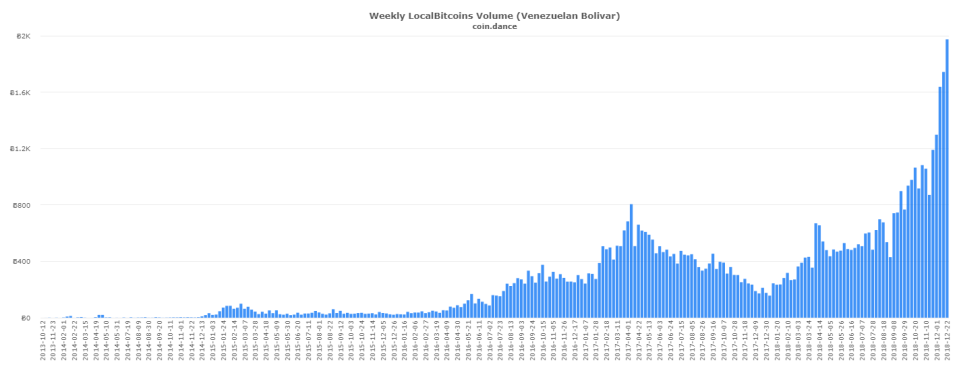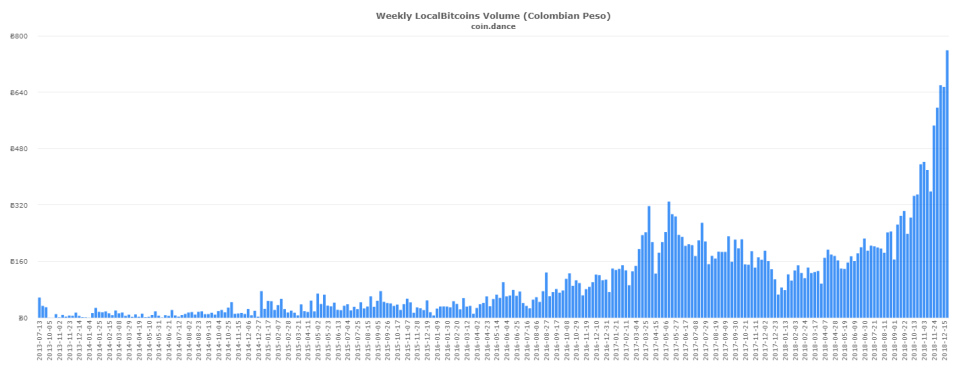Expert: How Bitcoin Can Help 4 Billion People in Authoritarian Countries

Bitcoin can help 4 billion people around the world living in authoritarian countries, according to a new essay from Human Rights Foundation Chief Strategy Officer Alex Gladstein. And there are few countries as receptive to cryptocurrencies as Venezuela. In fact, take a look at information from Localbitcoins, and you’ll see citizens of this impoverished Latin American country are buying up bitcoins like they’re going out of style.
This week, the number of purchases of BTC leaped by 11 percent to reach an all-time high of 1,974 BTC.

Numbers in Colombia are also surging as Venezuelans flee over the border to safer pastures. President Maduro may plead with them to return to their struggling homeland, but with pensioners forced to receive their stipends in Petro, a civilian militia at 1.6 million strong, a national currency losing value by the second, and people starving in the streets, that’s hardly a tempting option.

Bitcoin’s Volatility is Relative
Plenty of people shrink from a volatile asset that loses 80 percent of value from one year to the next. But when your own national currency depreciates by 95 percent from one day to the next, even a “volatile” asset like bitcoin becomes appealing.
According to the IMF, inflation in Venezuela is on track to close this year at a whopping one million percent. In the US, stock markets nosedive, businesses protest, and even the president-elect calls the Federal Reserve “crazy” for hiking rates by a fraction of a percent. One million percent is incomprehensible to anyone in their right mind, and yet this figure is very real for Venezuelans.
What should the country’s citizens do with their bolivares except use them to light firewood to cook whatever scraps of food they can find?
In a discussion with a Bitcoin economist, the Spectator’s Business Editor Martin Vander Weyer said:
Venezuelans love bitcoin well, of course, they may do because it’s chaos in their country.
But it’s not just Venezuela that’s seeing increasing adoption of bitcoin.
Bitcoin in Authoritarian Countries
In fact, bitcoin can provide a way of shielding people’s wealth in any country where the people are forced to live under authoritarian governments. Just think about Zimbabwe, where its leader Robert Mugabe also printed out so much cash that he reduced his country’s citizens’ wealth to nothing and forced them to load up wheelbarrows of cash to purchase groceries.
Then there are countries with frowned-upon human rights policies like Turkey, Iran, and China. People can use cryptocurrencies like bitcoin as a way of eluding government censorship and avoiding having their transactions thrust under a magnifying glass.
Cryptocurrencies like Zcash, Dash, Litecoin, and Monero even allow people to send SMS remittances, allowing them to access wealth even when they can’t access a bank. This means that refugees can receive payments and be included in the financial system.
Under 1 percent of the world currently uses bitcoin. With no more than 40 million users, the numbers are not even strong enough to make up a respectable social media platform. However, more than 50 percent of the world lives in authoritarian regimes.
Bitcoin may be clunky, volatile, slow, and not particularly user-friendly. But with improved infrastructure, mobile wallets, SMS payments, better exchanges, and education, it can (and already is) making a difference to the lives of 4 billion people living in authoritarian countries.
Featured Image from Shutterstock
The post Expert: How Bitcoin Can Help 4 Billion People in Authoritarian Countries appeared first on CCN.

 Yahoo Finance
Yahoo Finance 
